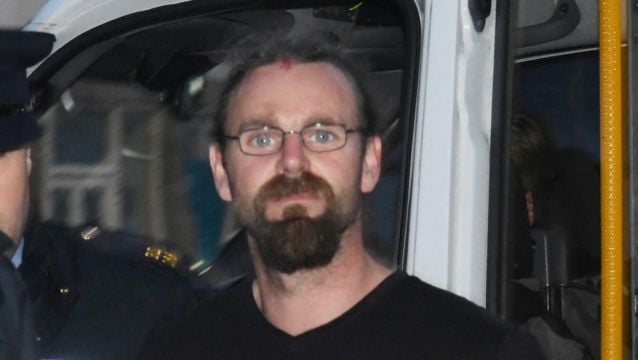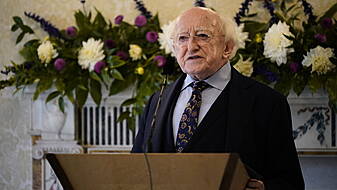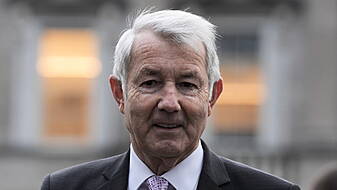It would be "unsafe" to convict Stephen Silver of the murder of Garda Colm Horkan given the evidence that he was suffering from a relapse of his mental disorder at the time of the shooting, a barrister has told the Central Criminal Court.
Roisin Lacey SC, for Mr Silver's defence, in her closing speech asked the jury to consider the evidence of consultant psychiatrist Dr Brenda Wright who told the trial that Mr Silver's responsibility for the shooting was diminished by a relapse of his bipolar affective disorder.
Ms Lacey said there is no doubt that what happened to Garda Horkan was a "tragedy of unspeakable proportions. You know that, we know that, and Mr Silver knows that. Colm Horkan was unlawfully killed, there was no legal justification for his death and by his plea, Mr Silver has accepted that and acknowledged his responsibility for that unlawful killing".
She told the jury that it is his level of culpability that is in issue, and she asked them to look at the evidence of Dr Wright who said that Mr Silver was mentally unwell secondary to non-compliance with his medication.
Interviews
She reminded the jury that Dr Wright said the best evidence of Mr Silver's condition was his interviews with gardaí, which began 14 hours after the shooting and were recorded on DVD.
In his first interview Dr Wright noted that Mr Silver was restless, talkative and over-familiar, engaged in inappropriate laughing and appeared elated. As the interviews continued he became irritable and agitated, expressed persecutory and delusional beliefs and by the third and fourth interviews he was becoming more erratic.
By his fifth and final interview on the second day of his detention Dr Wright described Mr Silver's behaviour as "bizarre, agitated, irritable and aggressive with evidence of grandiose delusions".
Dr Wright said that a defence of diminished responsibility due to mental disorder would be appropriate given his condition at the time.
Ms Lacey said that taking Dr Wright's evidence into account "and all of the other aspects of the evidence, I suggest to you, it would be highly unsafe to convict Mr Silver of capital murder, or any murder".
Mr Silver (46), a motorbike mechanic from Aughaward, Foxford, Co Mayo has pleaded not guilty to the murder of Detective Garda Horkan knowing or being reckless as to whether he was a member of An Garda Síochána acting in accordance with his duty. He pleaded guilty to manslaughter by reason of diminished responsibility, at Castlerea, Co Roscommon on June 17th, 2020.
Mr Silver accepts that he shot and killed Gda Horkan but Dr Brenda Wright, a psychiatrist called by his defence, said that the accused was suffering at the time from bipolar affective disorder, a mental illness that diminished his responsibility. Professor Harry Kennedy, who was called by the prosecution, disagreed with Dr Wright and said that Mr Silver's mental capacity was intact at the time of the killing.
At the beginning of her address to the jury Ms Lacey also asked the jury to consider whether the prosecution had proven that Garda Horkan was actually a member of An Garda Síochána acting in accordance with his duty. She said the prosecution had provided no explanation for a discrepancy between the date when Garda Horkan's identification card was issued and the date on which he was said to have been attested as a garda.
Ms Lacey also said that Garda Horkan's identification number as given to the jury by a garda who was called by the prosecution differed from the number on his identity card.
She said she accepted that there was evidence from a senior garda who said she had given Garda Horkan the duties of a detective on the day in question and there was evidence from other gardaí about Garda Horkan coming on duty that day. But, Ms Lacey added: "What wasn't before you was formal proof in relation to his membership of An Garda Síochána and the law is that the prosecution must prove each and every element beyond a reasonable doubt and yet, there are discrepancies that are not yet explained."
She told the jury that the issue of membership is a matter for them.
Counsel said that in cases where a person claims diminished responsibility due to a mental disorder, it is up to the defence to prove its case on the balance of probabilities.
She said that the evidence heard proves to that standard that Mr Silver was in a relapse at the time of the killing, and added: "On that basis we urge you to find his responsibility was substantially diminished and to return a verdict of not guilty of murder but guilty of manslaughter on the basis of diminished responsibility."
Evidence
She reminded the jury of the evidence of Mr Silver's sister, Marian Bruen, who knew from a telephone call with her brother the day before the shooting that he needed to be admitted to a psychiatric hospital.
Mrs Bruen said she had seen her brother during his first admission in 1997 and during several relapses since then. She described him as a "nine out of ten" and contacted her mother to say that he needed to go to hospital.
Ms Lacey said there was further evidence of Mr Silver engaging in abnormal behaviour and having delusional beliefs in the days and hours leading up to the shooting. He said he believed a woman he was seeing was a member of MI6 and that a group of builders he saw in Dublin were members of the SAS and might have planted a bomb under his van.
She reminded the jury that he gave away a "prized motorbike" that he had spent three years working on and €1,000 worth of biking gear at a time when he had just €300 in his bank account.
He then drove his prized bike at speed through the Knockroe housing estate in Castlerea where he was also seen engaging in "extraordinarily peculiar behaviour" such as ducking and crouching behind walls, pacing up and down and "ranting to himself".
Many of the behaviours noticed by Knockroe residents mirrored the behaviour Mr Silver displayed during previous admissions to psychiatric hospitals, Ms Lacey said.
She also told the jury that Mr Silver told consultant psychiatrist Prof Harry Kennedy that when he was speaking to his friend James Coyne as they walked towards the scene of the shooting,
Mr Silver thought he was talking to Mr Coyne's dead brother. Ms Lacey described as a "critical omission" Prof Kennedy's failure to further explore Mr Silver's claim that he was speaking to a dead person in the minutes leading up to the shooting.
She also described as a critical omission what she said was Prof Kennedy's failure to mention in his reports Mr Silver's most bizarre behaviours during his garda interviews.
She said Mr Silver had stuffed tissue up his nose which he then chewed and spat out, put his toes in his mouth, ate the contents of his ear, took on a contorted position while staring at gardaí, breathed heavily and slapped his stomach. She said the only bizarre behaviours mentioned by Prof Kennedy were that Mr Silver whistled, sang and played with the window blinds.
She pointed to further evidence in the aftermath of the shooting which she said showed Mr Silver was "detached from reality".
At one point he pointed to a badge on his waistcoat and told a garda at the scene that he was in the air force.
When he was placed in a cell at Castlerea Garda Station he urinated on the floor, took his clothes off, waved his genitals and spat at a garda.
Behaviour
He smashed a toilet seat and blocked the toilet in his cell. Ms Lacey said his behaviour showed him in a "completely inappropriate and detached state" as though he were "acting out in a movie, disconnected from reality."
She said his behaviour indicated that he was, as one witness to the shooting put it, "crazy".
Dr Greg Kelly told the trial that he saw Mr Silver at Castlerea station in the early hours following the shooting and found him to be paranoid, delusional and out of touch with reality.
Consultant psychiatrist Dr Will Monteiro saw Mr Silver some hours later and found that he was not suffering from an acute mental illness. Ms Lacey said it would be an "extraordinary leap of faith" to rely on Dr Monteiro's evidence.
Ms Lacey said the psychiatrist had seen Mr Silver through a hatch in his cell door that was six inches by eight inches. Mr Silver initially refused to speak and when Dr Monteiro returned for a second interview, she said, it lasted no more than seven minutes.
"Is that appropriate in dealing with a mental health issue, with someone who has an extraordinary and complex background of mental health issues?" she asked.
Ms Lacey accepted that it was Mr Silver's choice not to take his medication following numerous admissions to psychiatric units, the final one nine months before the shooting. But she warned the jury that there is "nothing in the law that says you have to consider how he got to that state of mental unwellness".
She added: "The law doesn't allow you to look behind that and say, yeah he had a mental disorder, but he didn't take his medication so therefore I can discount it. You would fall into grave error if you did that."
Ms Lacey said it is a human trait to want to point the finger of blame or to punish Mr Silver for not taking his medication but, she said, the law doesn't allow that.
'Grudge'
She said there is no evidence that Mr Silver bore a "grudge" against gardaí or that he ever acted aggressively towards gardaí when he was well.
His violent, threatening and aggressive behaviour in the past had always been when he was "extremely mentally unwell," she said. She said it is also extremely unlikely that Mr Silver remembered Garda Horkan from an incident in 2003 when he helped to bring Mr Silver to a psychiatric hospital.
Ms Lacey also pointed to Dr Wright's contradiction of Prof Kennedy who had said that you can infer capacity from purposeful actions and that Mr Silver had shown an ability to carry out purposeful or complex sequences of actions.
Ms Lacey urged the jury consider Dr Wright's statement that capacity is not absolute and that "just because someone behaves in a purposeful way in relation to a particular act... you can't simply infer from that that the person has capacity generally."
Taking all the evidence into account, Ms Lacey said the prosecution had failed to prove its case and the defence had proven that it is more probable than not that Mr Silver was in a state of relapse at the time of the killing.
Mr Justice Paul McDermott will begin his charge to the jury of seven men and five women on Wednesday.







